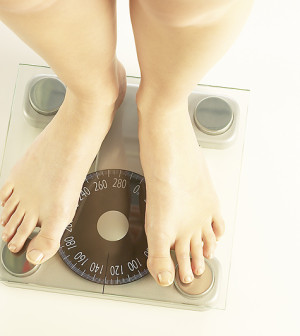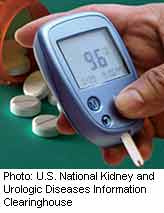- 10 Strategies to Overcome Insomnia
- Could Artificial Sweeteners Be Aging the Brain Faster?
- Techniques for Soothing Your Nervous System
- Does the Water in Your House Smell Funny? Here’s Why
- Can a Daily Dose of Apple Cider Vinegar Actually Aid Weight Loss?
- 6 Health Beverages That Can Actually Spike Your Blood Sugar
- Treatment Options for Social Anxiety Disorder
- Understanding the Connection Between Anxiety and Depression
- How Daily Prunes Can Influence Cholesterol and Inflammation
- When to Take B12 for Better Absorption and Energy
People With Type 2 Diabetes Do Benefit From Blood Sugar Checks


Personalized blood sugar self-monitoring benefits people with type 2 diabetes even if they’re not taking insulin, a new small study shows.
Some experts have questioned the value of self-monitoring in this group, and many insurers — including Medicare — limit the reimbursement of blood sugar (glucose) testing strips to one a day for people with type 2 diabetes.
This study included 11 people with type 2 diabetes who worked with the researchers to create personalized, structured self-monitoring blood glucose schedules. In most cases, self-monitoring twice a day was the most helpful in providing meaningful information about blood sugar levels.
However, there was room for individualization based on a patient’s type of lifestyle and needs. For example, a patient might check their blood sugar twice a day three days a week instead of once a day seven days a week, according to the study authors.
People were taught to react to their blood sugar levels readings in a number of ways, such as eating less or going for a walk.
The 11 patients in the study lowered their A1C levels — a test that measures average blood sugar levels for the past few months — from an average of 7.3 percent to 6.2 percent. The usual goal for people with diabetes is to keep those levels below 7 percent, the researchers explained.
“Most of the participants in the study were self-described ‘country folk’ who found that they were able to control their diabetes. This study helps doctors and nurses to understand how people with type 2 diabetes can benefit from [self-monitoring],” study author Dana Brackney, a diabetes educator and an assistant professor of nursing at Appalachian State University in Boone, N.C., said in an American Association of Diabetes Educators (AADE) news release.
The findings were to be presented Wednesday at the AADE annual meeting in New Orleans. Research presented at meetings is generally viewed as preliminary until it has been published in a peer-reviewed journal.
The results confirm that people with type 2 diabetes do respond to the results of blood sugar self-monitoring tests, Dana Brackney noted.
“Participants in this study said that sticking to a regular [self-monitoring] schedule really helped them to know where their blood levels were and take appropriate action, such as adding physical activity or choosing a healthy snack,” Brackney said.
“They said it helped them accept that they had diabetes, but also feel confident that they could control it rather than letting it control them,” she added.
More information
The U.S. National Institute of Diabetes and Digestive and Kidney Diseases has more about diabetes.
Source: HealthDay
Copyright © 2026 HealthDay. All rights reserved.










